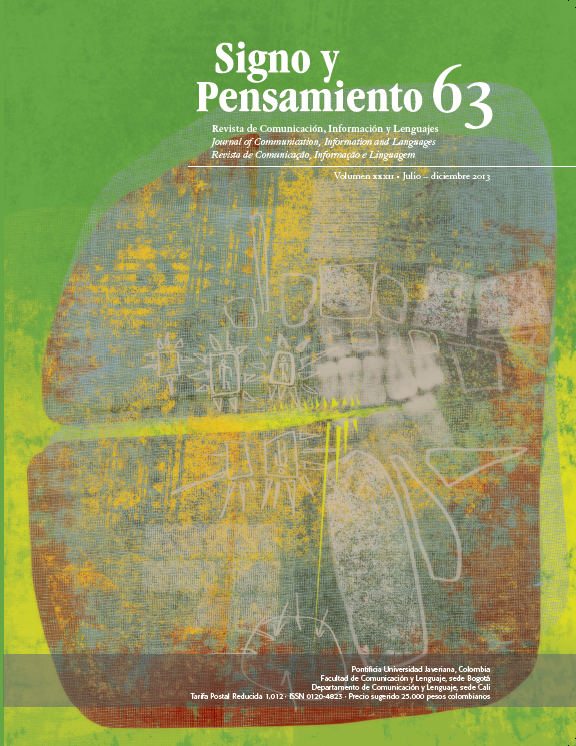Resumo
Por encargo del Centro Internacional para la Justicia Transicional (CIJT) se realizó un estudio sobre las elecciones locales del 30 de octubre de 2011, centrado en los “candidatos de observación especial”, es decir, sindicados de tener alianzas con políticos investigados y procesados por nexos con el paramilitarismo. El propósito que orientó la observación fue determinar si la prensa regional, en un contexto de sospecha razonable respecto a esos vínculos, cumplió su rol de “perro guardián de la democracia”, al denunciar conductas irregulares en el periodo preelectoral y postelectoral; si defendió intereses políticos o se mantuvo neutral. La observación se hizo en tres departamentos de alto riesgo electoral, con el propósito de analizar cómo fue el tratamiento periodístico que recibieron estos candidatos en 14 medios seleccionados, incluyendo los diarios de referencia nacional y los regionales con ese ámbito de cubrimiento.
Arruda, A., & de Alba, M. (Coords.). (2007). Espacios imaginarios y representaciones sociales. Aportes desde Latinoamérica. México: Anthropos, Universidad Autónoma Latinoamericana.
Calderón, D. (2005). Mapa de riesgo para periodistas. Brasil, Colombia, México. Sociedad Interamericana de Prensa. Recuperado de http://www.centrodepublicaciones.com/upload/files/libro_37_82.pdf.
Cohen, B.C. (1963). The press and foreign policy. Princeton: Princeton University Press.
Entman, R. M. (2004). Projections of power. framing news, public opinion, and u.s. foreign policy. Chicago: University of Chicago.
FLIP. (2012). ¿La censura en las regiones llegó para quedarse? Informe sobre el estado de la libertad de prensa en Colombia, 2011. Bogotá: Fundación para la Libertad de Prensa.
Kovach, B., & Rosenstiel T. (2003) Los elementos del periodismo. Madrid: Ediciones El País.
McCombs, M., & Shaw, D. (1972). The agenda-setting function of mass media. The Public Opinion Quarterly, 36(2), Summer, 176-187.
Perelman, Ch. (1997). El imperio retórico, retórica y argumentación. Bogotá: Norma. Piñuel, J. L. (2002). Epistemología, metodológica y técnicas del análisis de contenido. Estudios de Sociolingüística, 1(3), 1-42.
Rey, G. (2005). Los relatos periodísticos del crimen. Bogotá: Centro de Competencia en Comunicación, Fundación Fiedrich Ebert.
Esta revista científica se encuentra registrada bajo la licencia Creative Commons Reconocimiento 4.0 Internacional. Por lo tanto, esta obra se puede reproducir, distribuir y comunicar públicamente en formato digital, siempre que se reconozca el nombre de los autores y a la Pontificia Universidad Javeriana. Se permite citar, adaptar, transformar, autoarchivar, republicar y crear a partir del material, para cualquier finalidad (incluso comercial), siempre que se reconozca adecuadamente la autoría, se proporcione un enlace a la obra original y se indique si se han realizado cambios. La Pontificia Universidad Javeriana no retiene los derechos sobre las obras publicadas y los contenidos son responsabilidad exclusiva de los autores, quienes conservan sus derechos morales, intelectuales, de privacidad y publicidad.
El aval sobre la intervención de la obra (revisión, corrección de estilo, traducción, diagramación) y su posterior divulgación se otorga mediante una licencia de uso y no a través de una cesión de derechos, lo que representa que la revista y la Pontificia Universidad Javeriana se eximen de cualquier responsabilidad que se pueda derivar de una mala práctica ética por parte de los autores. En consecuencia de la protección brindada por la licencia de uso, la revista no se encuentra en la obligación de publicar retractaciones o modificar la información ya publicada, a no ser que la errata surja del proceso de gestión editorial. La publicación de contenidos en esta revista no representa regalías para los contribuyentes.


